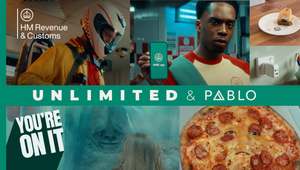
Welcome to the Automation Revolution

An exciting new era that’s propelled by automation but defined by imagination.
In the past, the word automation conjured images of the herculean power of heavy machinery on construction sites or the dazzling speed of factory production lines. This efficient machinery saved billions of dollars in labour, energy and materials, as well as enabling the creation of extraordinary buildings and products alike.
Automation today, however, has taken on an altogether different meaning. Digital processing power is growing fast and Artificial Intelligence (A.I.) is becoming a reality. It’s feasible to envision a world where machines could perform any intellectual, or even creative, task that a human can.
This might sound far-fetched, but when you consider where we are starting from it quickly becomes believable. After all, the world is becoming more automated every day. From the rapid adoption of contactless and mobile payments in the UK, to the gradual adoption of Tesla’s driverless cars in the US. Nike have recently even released the self-lacing trainers first imagined in Back To The Future Part 2. Our lives are becoming more and more frictionless.
But is the uniquely human talent and ability to think and be creative really under threat? Is the communications and advertising industry going the same way as a factory production line, destined to be fulfilled by robots?
We don’t think so. Instead we believe the advent of automation will create a new landscape where imagination and creativity will flourish.
Marketing Automation
The biggest driver of change in the industry right now is marketing automation. It’s becoming easier to harness huge swathes of behavioural data to fuel automated ‘real-time’ decision-making. This enables marketers to get ever closer to the panacea of right customer, right message, right time and right channel. Advancing A.I. capabilities can vastly improve customer experience management, by making instant decisions based on data, and assisting the design and execution of customer interactions.
Capitalising on this potential isn’t just reserved for big brands with sophisticated marketing technology platforms. Take Fuzzy.ai for example, a software company that makes A.I. more widely accessible and easy to use. Their system takes your knowledge and intuition about your business and converts it into an algorithm that improves automatically, helping you to make better decisions.
The established players like IBM are making this a commercial priority; in 2017 they will incorporate Watson (their A.I. algorithm) into their marketing cloud software. Watson will allow users to instantly harness intelligence from data in their marketing platform by using a simple conversational ‘Chatbot’ style interface. Within this platform they’ll be able to carry out complex, skilled tasks that are currently carried out by technical marketing experts. It is clear technology developments like these will demand far less human intervention, but they won’t function independently. The technology will still be dependent on the human mind for strategic thinking and creativity. Or will it…?
Artificial Creativity
There are already some emerging examples of automated creativity. One came about when the bank ING applied their innovative spirit to the sponsorship of Dutch art and culture. They literally taught a machine to think, act and paint like Rembrandt. Over two years, using 3D scanners, a deep-learning algorithm and facial recognition software, they analysed 346 paintings in order to re-create his unique style, which they printed using a 3D printer that uses paint based ink. An impressive use of technology admittedly, but it is clearly imitating creativity rather than originating creativity.
Automated creativity is even infiltrating advertising agencies. Dentsu in Japan recently hired the world’s first artificial creative director (AI-CD). A decade of award-winning work was uploaded to AI-CD, and rather worryingly, it applies algorithms to help set a creative direction based on the client brief.
In Hollywood, Sunspring was the first completely A.I. penned short film. Using a general text-recognition learning algorithm, they fed the machine with two decade’s worth of science fiction screenplays as its inspiration. The A.I. picked up on the commonalities of screenplay formats, but the resulting movie seriously lacked consistency and a compelling narrative.
Whilst these examples represent tremendous leaps in creative artificial intelligence, human involvement is much needed, and in some cases sorely missed. The truth is, the output of machines alone isn’t good enough. Robots don’t have the ability to freely associate in the same way humans do, meaning they simply don’t have the same capacity for imagination.
Unlocking Imagination
We believe the real automation tipping point for creativity and imagination will come when the technology moves from fulfilling a minor role to a majority role in the labour market, thus creating space for a new wave of imagination to flourish.
Consider the often unsung but enormous impact of the introduction of the washing machine and other household appliances. Which, by vastly reducing the work involved in carrying out household chores, allowed women to enter the labour market and virtually abolished professions like domestic service.
The current rapid adoption of automation and its projected impact on the labour market shares a number of key characteristics with the advent of the washing machine – and as such holds similar potential. The first being a significant reduction in the amount of time it takes to fulfill a given task and the second being the innate desire to imagine a new reality to put that time to use. It’s both the lack of time and repetitive low cognitive tasks that are the enemy of imagination and creativity. Automation removes these barriers.
Elon Musk, founder of Tesla, echoes this sentiment by saying ‘people will have time to do other things and more complex things, more interesting things’. Musk is a shining example of what’s possible when automation grants you the luxury of time. So, while the possibilities of automation are exciting – it is the opportunities to imagine granted by the gift of time which become really fascinating.
A New Dawn of Imagination
So when will this ‘tipping point’ happen and how might it manifest itself? According to Rice University professor, Moshe Vardi, ‘automation will claim 50% of all our jobs in the next 30 years’. And whilst that might be so, it’s unlikely that it will replace many jobs in their entirety, but rather that a percentage will become automated.
If Vardi is right, both client and agency businesses will be faced with the conundrum of either reducing the number of employees, reducing the number of hours work or redirecting employees spare capacity on new revenue generating activities. In reality, we will see a combination of all these scenarios, which will require people to imagine completely new roles for themselves and imagine fresh ways of creating value with their newly acquired ‘free’ time. This is the moment that will signal a new dawn of human imagination, or to put it another way – if knowledge was the key asset of the 20th century, then imagination will be the key asset of the 21st century.
It's Already Happening
There are already a whole host of instances where automation is completely redefining the human experience of the world. One of the most significant changes to the human experience brought about by automation is the way in which we discover information. Google have been using machine learning for years to guide people through cyberspace in the most seamless and relevant way possible. Amazon have been perfecting their purchase experience to make it as frictionless as possible – recently releasing the Amazon Echo which has taken it one step further, simply requiring you to ask a machine to order whatever it is you desire.
In other categories, automation is completely redefining the incumbent reality, from algorithms making new medical discoveries, controlling autonomous cars, to those interpreting human conversations like customer service Chatbots or even Google’s AI Assistant.
In all three cases, automation is carving out our new reality and therefore influencing the way we think, experience and imagine the world. So let us think about automation in terms of the possible, let’s imagine a new era and then create it.













